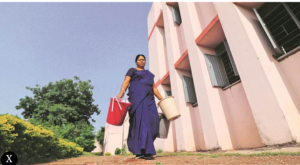 Sandhya Nikhare in 2003, her reality framed by her four-year-old son, a lengthening separation from her husband and a subject, English, to clear her Bachelor of Arts degree, Sandhya Nikhare wrote a number of entrance exams for government jobs. She was selected for the post of a Lower Division Clerk in Manipur, about 2,500 km from her hometown Bhandara in Maharashtra, where her parents were handloom weavers. With her family horrified by the distance, she let that opportunity slip away.
Sandhya Nikhare in 2003, her reality framed by her four-year-old son, a lengthening separation from her husband and a subject, English, to clear her Bachelor of Arts degree, Sandhya Nikhare wrote a number of entrance exams for government jobs. She was selected for the post of a Lower Division Clerk in Manipur, about 2,500 km from her hometown Bhandara in Maharashtra, where her parents were handloom weavers. With her family horrified by the distance, she let that opportunity slip away.
In the 150th year of Mahatma Gandhi’s birth, employed as a chowkidar-cum-sweeper at the Jawahar Navodaya Vidyalaya in Wardha, the town in central India where Gandhi unveiled his ‘new scheme of basic education’ at an all-India education conference in October 1937, she rues the BA she never completed. She is now among the thousands of workers at the frontlines of Swachh Bharat, the flagship cleanliness scheme launched on Gandhi Jayanti four years ago.
Mahatma Swachh Bharat: ‘What makes me happy is the fact that my struggles were not meaningless’
The Indian Express reporters fan out across the country to mark milestones in the Mahatma’s journey. To bring stories of the footsoldiers of Swachh Bharat, whose job it is to wipe, mop and dust where the Mahatma once walked.
Mahatma Swachh Bharat: ‘What makes me happy is the fact that my struggles were not meaningless’
Wardha: where Mahatma Gandhi set up his sevagram ashram. (Express photo by Nirmal Harindran)
As a young girl, Sandhya Nikhare wanted to be a teacher. Then in 2003, her reality framed by her four-year-old son, a lengthening separation from her husband and a subject, English, to clear her Bachelor of Arts degree, Sandhya Nikhare wrote a number of entrance exams for government jobs. She was selected for the post of a Lower Division Clerk in Manipur, about 2,500 km from her hometown Bhandara in Maharashtra, where her parents were handloom weavers. With her family horrified by the distance, she let that opportunity slip away.
In the 150th year of Mahatma Gandhi’s birth, employed as a chowkidar-cum-sweeper at the Jawahar Navodaya Vidyalaya in Wardha, the town in central India where Gandhi unveiled his ‘new scheme of basic education’ at an all-India education conference in October 1937, she rues the BA she never completed. She is now among the thousands of workers at the frontlines of Swachh Bharat, the flagship cleanliness scheme launched on Gandhi Jayanti four years ago.
Wardha: where Mahatma Gandhi set up his sevagram ashram
Sandhya Nikhare, 42
Job: Chowkidar-cum-sweeper at Jawahar Navodaya Vidyalaya
Salary: Rs 25,000
Work Hours: 11 hours (6 am to 5 pm)
Off day: Sunday, and half of Saturday
Cleans: School corridors, offices, 2 toilet blocks, girls’ dormitory building
Mahatma Swachh Bharat Part I: ‘I have been called a sweeper, it hurts… this is a temple, I am doing God’s work’
“Had I taken up that job in 2003 and completed my BA, I would have been much better off,” says Sandhya, 42. Eventually, it was only in 2013, 18 months after the death of her long estranged husband, who was a mess helper at the Navodaya school, that she was granted Group D employment on compassionate grounds.
Run by a Central government undertaking, Navodaya schools have all undertaken cleanliness programmes as part of the Swachh Bharat programme. At Wardha, principal R Nagabhushanam says all 500 students as well as teachers and other staff regularly clean the school themselves.
But Sandhya sees her work as Gandhian in a much more fundamental way. Her own work is important, she says, but not just because it’s about cleanliness. “Hard work in any field, to struggle and to persist, that’s what Gandhiji taught, right?”
That Wardha is home to a host of Gandhian institutions, including Sevagram Ashram, where the Mahatma lived for eight years, does not mean much to her. She first learnt about Gandhi in Class III or IV.
“The thing that makes me truly happy is the fact that my struggles were not meaningless. I was married before I could complete my graduation, but having seen my struggles as a single mother, my family made sure the other girls were financially independent. So my cousins are all well settled, one is a lecturer, one is in the medical field, others have good jobs,” she says. “That gives me great satisfaction.”
Sandhya starts work at 6 am, tidying the offices, gathering trash from bins, making sure the entrance and concourse are spotless. She then rings the 7 am prayer bell by striking a little hammer against a metal sheet hanging by the stairway.

